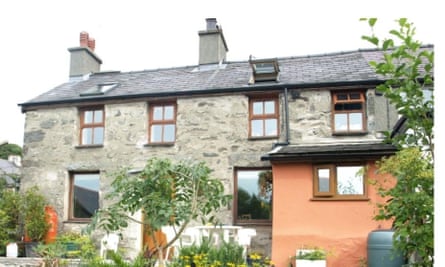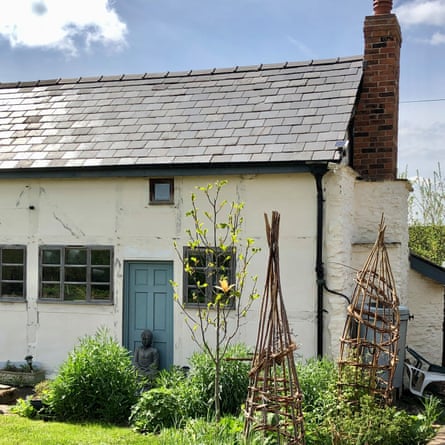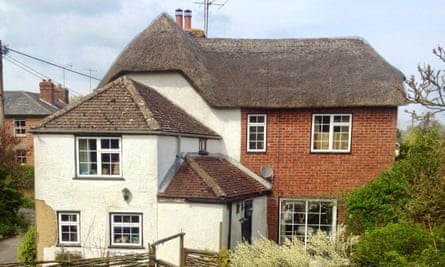Gillian Woodward, 50, says her house has been “completely transformed for the better” by installing an air source heat pump. Woodward, a community nurse in north Wales, was “astounded” to discover that she was eligible for a government-backed means-tested grant that covered the whole cost of insulating and installing a heat pump in her home.
“A lot of my friends have said they’re not sure about heat pumps,” says Woodward. “But the technology has improved a lot and satisfaction levels, even in old homes, are high. I thought it was worth the risk.”

Her experience chimes with the findings of a report by the thinktank Nesta last year that found satisfaction levels for heat pump users in Victorian or older properties were 83%, challenging the idea that the heating technology is only suited to those in newly built homes. The survey found that two-thirds of heat pump owners and 59% of gas boiler owners were satisfied even without extensive energy efficiency upgrades.
Woodward’s 1880 two-bedroom end of terrace house, which had been awarded an EPC F rating, previously relied on a liquefied petroleum gas (LPG) combination boiler. During the winter, Woodward used to get through a £75 gas bottle every 10 days, on top of monthly electricity costs of about £100 this time last year. “The costs of heating were astronomical even for the most minimal amount,” she says.
The community nurse qualified for the Eco 4 Flex grant due to having a household income below £31,000 and living in a property with an EPC rating of D or lower. Woodward’s home needed a fair amount of insulation work, with all the external walls internally insulated, pipes and radiators replaced, and the loft insulation improved, a process she describes as “very invasive” but worthwhile.
“I’m overall paying less, the house is consistently warm and much greener,” Woodward said. “I absolutely love the system. The house is warmer to an actually incomparable degree.”

She only completed her heat pump installation in autumn 2023 but is already seeing savings. In comparison with December 2022’s energy costs of about £325 between gas and electric, her electricity bill near the end of last year came to £230 for a much warmer home – and she expects her bills may fall further as she becomes accustomed to the settings.
This is signalling engineer Tom Corkley’s second winter with an air source heat pump in his 1962 three-bed dormer bungalow in Staffordshire, after installing it in August 2022. “We knew we would need a new boiler in the next year or two and went for a heat pump instead because of the CO2 savings. Overall we’re very happy with the system and it has kept us warm even in cold weather,” says the 32-year-old, adding that he has replaced a few of the property’s radiators and his home already had cavity wall insulation and some loft insulation.

Corkley explains he has had to make some adjustments to adapt to a heating system that works differently from the previous gas boiler. “It’s a different sort of heat and more comfortable overall. The key thing is to keep it on as long as possible in cold weather, including overnight. If you’re away it needs to either be left on at low level or started several days before returning. The lower flow temperatures mean it would take several days to warm the house from stone cold.”
Two-thirds (67%) of heat pump owners and 59% of gas boiler owners are satisfied with running costs, according to Nesta, and Corkley says he has not seen a noticeable change in his overall energy costs after accounting for price rises. But he does not know if he will recoup the costs of installation – he spent £7,000 on top of his £5,000 government grant – “unless the price of electricity falls relative to gas”. Since Corkley installed the system, the government has increased heat pump grants to £7,500.
Katy King, the deputy director of sustainable future at Nesta, says the thinktank’s research shows they have been largely popular with owners. “Heat pumps are a hit with people who have them installed. Three in four people are as, or more, happy with their heat pump compared with their previous heating system. Our research also found that high satisfaction with heat pumps was the same whether the house was a new-build or an older property.
She adds that people who registered lower satisfaction tend to be those who have moved into a property which already has a heat pump, which she says suggests “they would benefit from more information on how to best use their heat pump”.
after newsletter promotion

However, Susan Black, who recently retired from the care sector, has faced issues since taking the plunge and investing in a heat pump in late 2014 in an early 18th-century cottage in Herefordshire that she renovated with her partner. “We wanted to future-proof the cottage, having rescued it from complete dereliction in 2012,” Black, 67, says. “We have no access to mains gas and wanted to reduce our impact on the environment.”
Despite Black undertaking insulation work as part of the renovation, the air source heat pump’s running costs have been high, and as the cottage is Grade II-listed, they are not allowed to have standard double glazing. After a thermal imaging survey, they retrofitted the home with further insulation after the heat pump was installed, which has helped cut energy usage, but they now rely on a wood burning stove for heating, the pump for hot water, and solar panels for some of their electricity.
“I think [the issue] is the insulation and the fact electricity is very expensive – we found unless we had it cranked up to an enormously high level, it doesn’t feel warm. We’re in a rural area, we get power cuts – we had one last year that lasted three days. That’s another factor in us not wanting to completely rely on a heat pump.
“[The campaign group] Insulate Britain have a point – we need to insulate first and then convert, because otherwise there will be a huge backlash against green measures.”

Switching to a heat pump has delivered tremendous savings to others. Like 75% of heat pump owners surveyed by Nesta, Kristin Warry, 54, lives in a rural area, and has seen her monthly electricity direct debit halve from £363 in the winter of 2021 to £187 last month since she ditched her electric boiler for a heat pump system two years ago. Her three-bedroom thatched cottage in Wiltshire is made up of three sections that roughly date back to the 1770s, 1900s and 1980s.

“We are very happy to have a system that has saved us so much, and is on all the time. [For costs] to be down is brilliant, but we really didn’t expect that much of a saving. Having no gas pipes makes this a big opportunity for rural dwellers like ourselves,” she says, explaining that as a recipient of disability benefits, she received a £10,000 grant but had to pay just under £6,000 herself for the installation.
“We were lighting fires on cold days and wrapping up before – these days we just have heating on all the time. I’m disabled and so it’s been rather good for me,” Warry adds. “It’s a lot warmer, particularly at night. Before we had one or two warm rooms, but now the whole house is warm.”











